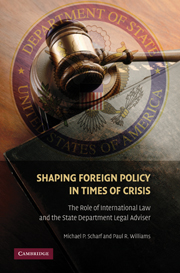 Shaping Foreign Policy in Times of Crisis
Shaping Foreign Policy in Times of Crisis Book contents
- Frontmatter
- Contents
- Acknowledgments
- Foreword: America's Conscience on International Law
- Introduction
- SHAPING FOREIGN POLICY IN TIMES OF CRISIS
- 1 The Compliance Debate
- 2 A Brief History of L
- 3 The Path to L
- 4 The Carter Administration – Herbert J. Hansell (1977–1979)
- 5 The Carter Administration – Roberts B. Owen (1979–1981)
- 6 The Reagan Administration – Davis R. Robinson (1981–1985)
- 7 The Reagan and Bush Administrations – Abraham D. Sofaer (1985–1990)
- 8 The Bush (41st) Administration – Edwin D. Williamson (1990–1993)
- 9 The Bush (41st) Administration – Michael J. Matheson
- 10 The Clinton Administration – Conrad K. Harper (1993–1996)
- 11 The Clinton Administration – David R. Andrews (1997–2000)
- 12 The Bush (43rd) Administration – William H. Taft IV (2001–2005)
- 13 The Bush (43rd) Administration – John B. Bellinger III (2005–2009)
- 14 Department of State Legal Advisers' Roundtable
- 15 Foreign Legal Advisers' Roundtable
- 16 Lawyering the Treatment of Detainees in the War on Terrorism
- 17 Conclusion
- Glossary of Terms
- Notes
- Annex: Legal Advisers of the U.S. Department of State
- Select Bibliography of Legal Scholarship by Department of State Legal Advisers
- About the Authors
- Other Books by the Authors
- Index
5 - The Carter Administration – Roberts B. Owen (1979–1981)
Published online by Cambridge University Press: 05 June 2012
- Frontmatter
- Contents
- Acknowledgments
- Foreword: America's Conscience on International Law
- Introduction
- SHAPING FOREIGN POLICY IN TIMES OF CRISIS
- 1 The Compliance Debate
- 2 A Brief History of L
- 3 The Path to L
- 4 The Carter Administration – Herbert J. Hansell (1977–1979)
- 5 The Carter Administration – Roberts B. Owen (1979–1981)
- 6 The Reagan Administration – Davis R. Robinson (1981–1985)
- 7 The Reagan and Bush Administrations – Abraham D. Sofaer (1985–1990)
- 8 The Bush (41st) Administration – Edwin D. Williamson (1990–1993)
- 9 The Bush (41st) Administration – Michael J. Matheson
- 10 The Clinton Administration – Conrad K. Harper (1993–1996)
- 11 The Clinton Administration – David R. Andrews (1997–2000)
- 12 The Bush (43rd) Administration – William H. Taft IV (2001–2005)
- 13 The Bush (43rd) Administration – John B. Bellinger III (2005–2009)
- 14 Department of State Legal Advisers' Roundtable
- 15 Foreign Legal Advisers' Roundtable
- 16 Lawyering the Treatment of Detainees in the War on Terrorism
- 17 Conclusion
- Glossary of Terms
- Notes
- Annex: Legal Advisers of the U.S. Department of State
- Select Bibliography of Legal Scholarship by Department of State Legal Advisers
- About the Authors
- Other Books by the Authors
- Index
Summary
WHEN HERB HANSELL LEFT THE DEPARTMENT IN 1979 and I stepped into his shoes, I spent the first week or two on the basics – learning what Secretary Vance and Deputy Secretary Christopher wanted from this 120-plus-person lawyer group, how the bureau was organized, how good or bad was the morale, how L's lawyers related to their clients in other bureaus of the Department, how L related to the General Counsel's offices of other departments, and, apart from general supervision, what were the particular issues to which I thought I could make a personal contribution.
The Iranian Hostage Crisis
This short and relatively relaxed learning period came to an abrupt halt when suddenly, and completely unexpectedly, the United States was plunged into a major international crisis – not outright war, to be sure, but close to the precipice – when a mob of Iranian “revolutionary students” attacked and seized the U.S. Embassy in Tehran on November 4, 1979, and captured fifty-two members of the Embassy's diplomatic staff.
Immediately, meetings were convened in the White House and the State Department to discuss how the United States should react. At first it was hoped that the new (post-Shah) Revolutionary Government of Iran would promptly step in and restore order, as in fact it had in a similar episode earlier in the same year, but very soon it became clear that the Ayatollah Khomeini government would not only not restrain the “students”; in fact, it quickly endorsed their conduct, thus committing the clearest possible breach of its international obligation, under the Vienna Conventions on Diplomatic and Consular Relations, to protect the Embassy and its personnel.
- Type
- Chapter
- Information
- Shaping Foreign Policy in Times of CrisisThe Role of International Law and the State Department Legal Adviser, pp. 47 - 54Publisher: Cambridge University PressPrint publication year: 2010


